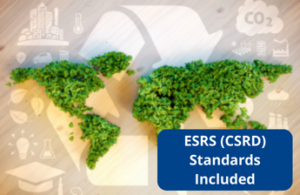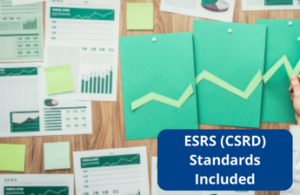Understanding the CSRD and CSDDD Regulations
The European Union has introduced two key regulatory frameworks aimed at enhancing Corporate Responsibility and Sustainability: The Corporate Sustainability Reporting Directive (CSRD) and the Corporate Sustainability Due Diligence Directive (CSDDD). Both directives serve to promote transparency and accountability in environmental and social governance (ESG) issues but focus on different aspects of sustainability practices.
CSRD: Corporate Sustainability Reporting Directive
Purpose and Scope:
The CSRD is designed to standardize and extend sustainability reporting across companies in the EU. It amends and expands upon the previous Non-Financial Reporting Directive (NFRD), targeting a wider range of companies, including large ones, listed SMEs, and non-EU companies that meet specific criteria. It introduces stringent reporting requirements, mandating companies to disclose their social and environmental impacts in a more detailed and audited format. These reports are required to be in line with the EU sustainability reporting standards and undergo independent audits.
Who Must Comply:
- Large EU companies and EU subsidiaries of non-EU parent companies that meet two of these three conditions: over €40 million in net turnover, more than €20 million on the balance sheet, or 250 or more employees.
- From January 2024, large public-interest entities already under the NFRD, with others following in subsequent years.
CSDDD: Corporate Sustainability Due Diligence Directive
Purpose and Scope:
The CSDDD mandates EU and non-EU companies to conduct due diligence throughout their value chains to mitigate adverse human rights and environmental impacts. This directive requires companies to establish processes to identify, prevent, mitigate, and account for the risks and impacts of their activities. It is applicable to large companies with significant operations or revenues in the EU and targets sectors with high impact on human rights and the environment, such as textiles and mineral extraction.
Who Must Comply:
- EU companies and non-EU companies with significant operational or revenue footprints in the EU, especially those in high-impact sectors.
- Requirements phase in starting with the largest companies and progressively including smaller ones over time.
These regulations signify a shift towards more responsible business practices, demanding higher transparency and proactive efforts in sustainability.
Differences and Similarities
While both directives aim to bolster corporate accountability and sustainability, their core focus areas differ. The CSRD is primarily concerned with reporting and transparency, ensuring that companies provide detailed and verifiable accounts of their ESG impacts. On the other hand, the CSDDD emphasizes the operational side, requiring companies to actively manage and improve their direct and indirect impacts on society and the environment.
Implementation and Impact
CSRD: Companies need to start preparing now, as the CSRD requirements will begin to take effect in 2024 for some and expand to more companies by 2025. The adoption of standardized reporting formats aims to facilitate better comparison and understanding of sustainability data across companies.
CSDDD: Implementation is staggered, with the largest companies needing to comply first, followed by smaller entities. The directive also encourages non-EU companies with significant EU market involvement to adopt similar practices, fostering a global approach to sustainable business practices.
Equip Yourself with the Right Knowledge through Our Courses
To navigate these regulations effectively and embed sustainable practices into your business strategy, education is key. Our Sustainability Academy offers self-paced courses that not only explain the regulations but also provide practical knowledge and tools to implement them:
1.Diploma on Corporate Sustainability: Foundation Course This course is perfect for those new to corporate sustainability or those looking to refresh their knowledge. It covers the basics of sustainability, the importance of CSR, and how to integrate sustainable practices into corporate strategy.

2. Online Certificate on Sustainability (ESG) Reporting Learn how to effectively report sustainability and ESG (Environmental, Social, Governance) initiatives in compliance with global standards, including the CSRD. This course is essential for professionals involved in data management and reporting in large companies.

3.Diploma on Sustainable Supply Chain Management This course provides in-depth knowledge on managing supply chains sustainably, ensuring compliance with the CSDDD. It is ideal for supply chain managers and compliance officers who need to understand and implement due diligence processes.

Special Offer: Enroll in both the Online Certificate on Sustainability (ESG) Reporting and the Diploma on Sustainable Supply Chain Management to receive a 20% discount on your tuition. This offer is perfect for professionals looking to master both reporting and supply chain sustainability under the new EU regulations.
By enhancing your understanding and skills with these courses, you can lead your company to not only comply with these regulations but also to thrive in a sustainable future.

